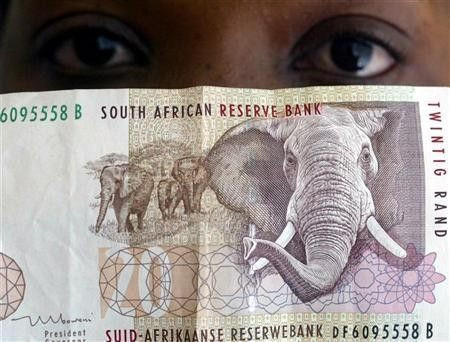S.Africa's rand off 2-month highs but stocks tumble

South Africa's resource-heavy bourse tumbled on Wednesday with gold miners helping to drag the index down as strikes over wages loomed in the sector.
The rand was off two-month highs hit earlier in the session as investors pulled out of high risk assets on worries about stalled debt talks in the United States.
Government bonds ended stronger, continuing to attract buyers, especially from abroad.
Yields were down across the curve, with the 2015 yield down 3.5 basis points to 7.36 percent and that on the 2026 note falling four basis points to 8.5 percent.
The rand was trading at 6.6682 to the dollar, not far from Tuesday's New York close of 6.6850. It hit a new two-month high of 6.6285 earlier in the session but retreated in late trade as the dollar rallied.
"We have seen the rand tracking the euro very closely ... And now that the euro is below 1.44 it is driving the rand back up to 6.69," said Brigid Taylor, dealer at Nedbank.
The rand met resistance at 6.63, which attracted importers buying of foreign exchange. Dealers said there was not evidence of central buying yet.
The rand is mostly taking its direction from international developments and could weaken if the stalemate in the U.S. debt talks continues, Standard Bank said.
A close above 6.70 would signal further losses for the rand.
STRIKES BITE
Despite the gold price hitting fresh highs at $1,628 an ounce earlier, shares in gold mining companies fell as the powerful Union of Mineworkers said it would strike on Thursday over wages at the country's top three gold producers.
The gold index slid 0.78 percent, with heavyweight AngloGold Ashanti , falling 1 percent to 290.08 rand. Goldfields dropped 0.67 percent to 103.50 rand.
Output is typically affected temporarily by strikes but most firms are usually prepared for the annual strikes and ramp up production once workers are back to work. Economists only start to worry when the strikes drag on for more than a month.
Johannesburg's mining index fell 0.8 percent.
The Johannesburg's Top-40 index of blue chips lost nearly 1 percent to end at 28,247.49 and the All-Share index slipped 0.9 percent to 31,593.99.
Steelmaker ArcelorMittal was the biggest loser after reporting a 63 percent drop in first-half profits.
Shares in the company shed as much as 7 percent in the session to the lowest since March 2009 and the biggest one-day fall in over a year. They recouped some losses to end 6 percent down at 69.75 rand.
"Shareholders may be bullish on the fact that demand for steel and the steel prices are going to increase in the long term, but I think rising costs that are facing this company locally are going to offset any increase in the steel price," said Byron Lottery, an analyst at Vest act. (Editing by Susan Fenton)
© Copyright Thomson Reuters 2024. All rights reserved.




















